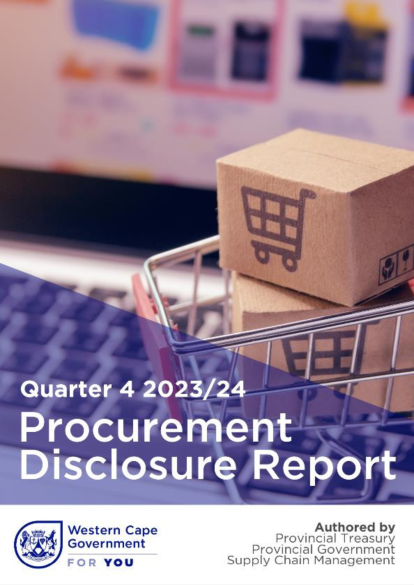Procurement Disclosure Report
Witness a groundbreaking milestone in South Africa's public procurement landscape with the launch of the Western Cape Provincial Treasury's pioneering Procurement Disclosure Report (PDR). Unveiling an unprecedented level of transparency, this report sets a new standard for accountability and openness in government spending.
In 2020 the Provincial Treasury unveiled a comprehensive Procurement Disclosure Report, shedding light on all Covid-19 related procurement activities undertaken by Western Cape Government departments and entities. This monumental initiative underscores our unwavering dedication to upholding the highest standards of governance and transparency within the Western Cape.
But the innovation doesn't stop there. The Procurement Disclosure Report was later expanded to increase procurement reporting beyond Covid-19 related purchases and now offer an online version in the form of a cutting-edge web-enabled dashboarding system. This dynamic platform not only streamlines the reporting process but also empowers users with unparalleled flexibility and interactivity. Stakeholders and oversight bodies can effortlessly access real-time procurement data tailored to their specific needs, fostering informed decision-making and enhancing accountability.
We invite you to explore this invaluable resource and join us in our mission to fortify good governance practices across the Western Cape.
For more information and to submit feedback or suggestions on improvements to the Public Disclosure Report, please email our Supplier Helpdesk.
Procurement Disclosure Dashboard
Click on the arrow to enable full screen viewing
To access the full National Treasury dashboard visit: http://ocpo.treasury.gov.za/COVID19/Pages/Reporting-Dashboard.aspx
Download Procurement Reports:
- Procurement Disclosure Report Q4 2023/24
- Procurement Disclosure Report Q3 2023/24
- Procurement Disclosure Report Q2 2023/24
- Quarter 1: 2023/2024 Procurement Disclosure Report (PDR)
- Annual Procurement Disclosure Report (PDR) for 2022/2023 Financial year
- Quarter 3 : 2022/23 Procurement Disclosure Report
- Quarter 2 : 2022/23 Procurement Disclosure Report
- Procurement Disclosure Report 1 March 2022 to 31 May 2022
- Quarter 1 : 2022/23 Procurement Disclosure Report
- Annual Procurement Disclosure Report (PDR) for 2021/2022 Financial year
- May 2022
- April 2022
- March 2022
- February 2022
- January 2022
- Procurement Disclosure Report Quarter 3: 01 October 2021 to 31 December 2021
- December 2021
- November 2021
- October 2021
- Quarterly Procurement Disclosure Report (PDR) 01 July 2021 to 30 September 2021
- September 2021
- August 2021
- July 2021
- Quarterly Procurement Disclosure Report (PDR) 01 April 2021 to 30 June 2021
- June 2021
- May 2021
- April 2021
- Annual Procurement Disclosure Report (PDR) 1 March 2020 - 31 March 2021
- March 2021
- February 2021
- Procurement Disclosure Report Quarter 3: 2020/21
- January 2021
- December 2020
- November 2020
- October 2020
- September 2020
- April 2020 / August 2020
- April 2020 / July 2020
- April 2020 / June 2020

